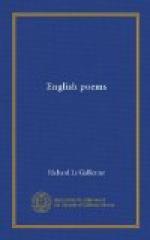So like a star I listened, till mine eye
Caught that lone land across the water-way
Wherein my lady breathed,—now
breathing is—
‘O Dante,’ then I said, ’she more
than I
Should know thy comfort, go to her,
I pray.’
‘Nay!’ answered
he, ‘for she hath Beatrice.’
XII
A LOST HOUR
God gave us an hour for our tears,
One hour out of all the years,
For all the years were another’s gold,
Given in a cruel troth of old.
And how did we spend his boon?
That sweet miraculous flower
Born to die in an hour,
Late born to die so soon.
Did we watch it with breathless breath
By slow degrees unfold?
Did we taste the innermost
heart of it
The honey of each sweet part
of it?
Suck all its hidden gold
To the very dregs of its death?
Nay, this is all we did with our hour—
We tore it to pieces, that precious flower;
Like any daisy, with listless mirth,
We shed its petals upon the earth;
And, children-like, when it all was done,
We cried unto God for another one.
XIII
MET ONCE MORE
O Lady, I have looked on thee once more,
Thou too hast looked on me, as thou hadst said,
And though the joy was pain, the pain was bliss,
Bliss that more happy lovers well may miss:
Captives feast richly on a little bread,
So are we very rich who are so poor.
XIV
A JUNE LILY
[The poet dramatises his Lady’s loneliness]
Alone! once more alone! how like a tomb
My little parlour sounds which only now
Yearned like some holy chancel with his voice.
So still! so empty! Surely one might fear
The walls should meet in ruinous collapse
That held no more his music. Yet they stand
Firm in a foolish firmness, meaningless
As frescoed sepulchre some Pharaoh built
But never came to sleep in; built, indeed,
For—that grey moth to flit in like a ghost!
Alone! another feast-day come and gone,
Watched through the weeks as in my garden there
I watch a seedling grow from blade to bud
Impatient for its blossom. So this day
Has bloomed at last, and we have plucked its flower
And shared its sweetness, and once more the time
Is as that stalk from which but now I plucked
Its last June-lily as a parting sign.
Yea, but he seemed to love it! yet if he
But craved it in deceit of tenderness
To make my heart glow brighter with a lie!
Will it indeed be cherished as he said,
Or will he keep it near his book a while,
And when grown rank forget it in his glass,
And leave it for the maid who dusts his room
To clear away and cast upon the heap?
Or, may be, will he bury it away
In some old drawer with other mummy-flowers?




